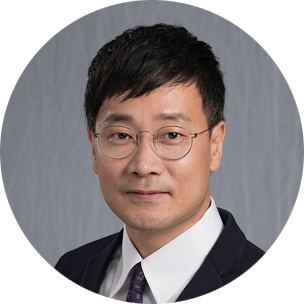About Dr. Younbo JUNG

Profile
Dr. Younbo JUNG is Associate Professor and Associate Chair - Academic at the Wee Kim Wee School of Communication and Information, Nanyang Technological University, Singapore. Dr. JUNG earned his Ph.D. at the Annenberg School for Communication and Journalism at the University of Southern California.
In teaching, Dr. JUNG received four teaching-related awards at NTU, including Nanyang Education Award (University) - Bronze in 2014. He is the inaugural Fellow of Teaching Excellence Academy since 2014. In research, his interests include socio-psychological effects of interactive media such as video games, virtual reality systems, human-robot interaction, and their applications in education and medical aids for seniors. For example, his research examined the use of virtual reality and haptics-enhanced systems for learning motor functions in stroke rehabilitation, patient/clinician distribution platform with tele-rehabilitation application, the internet and computer training for seniors, the effect of social robots' embodiment on their meaningful social interaction with humans, and the use of video games and social TV for seniors' subjective well-being and intergenerational bonding. Dr. JUNG supports interdisciplinary research and has successfully collaborated on many research projects with scholars in computer science, electrical engineering, physical therapy, and social work.
Abstract
Title: How to Use Technologies for Seniors to Overcome Their Fear of Technologies
Emerging smart cities are designed to help citizens to have more convenient daily lives with automated services using AI and latest technologies. Despite the good intention, however, there are marginalized groups, such as seniors who fell behind the rapid changes in various technologies, indicating a new wave of digital divide. Although there are several technology innovations that are designed to help seniors who are weak and frail, this stereotypical image of frail seniors is hardly an accurate description of many seniors who can and want to lead an active life with dignity and autonomy. As such, an important question is how to support seniors’ acquisition of the appropriate capacities to take advantage of technologies so that they can flourish in fast-changing smart cities. Research done by the Ministerial Committee for Ageing in Singapore reveals that seniors have a desire to learn, but also wish that courses can be tailored to their individual needs. In this talk, I will present my research that utilizes virtual reality technology to train seniors on how to use daily automated tasks as a way to empower seniors to live independently and with dignity in the envisioned smart nation of Singapore. The presentation will include different pedagogical approaches for senior education, constructivism and scaffolding in teaching and learning, as well as the results of empirical experiment that investigated the effectiveness of various pedagogical approaches.


